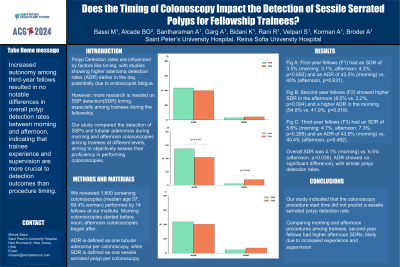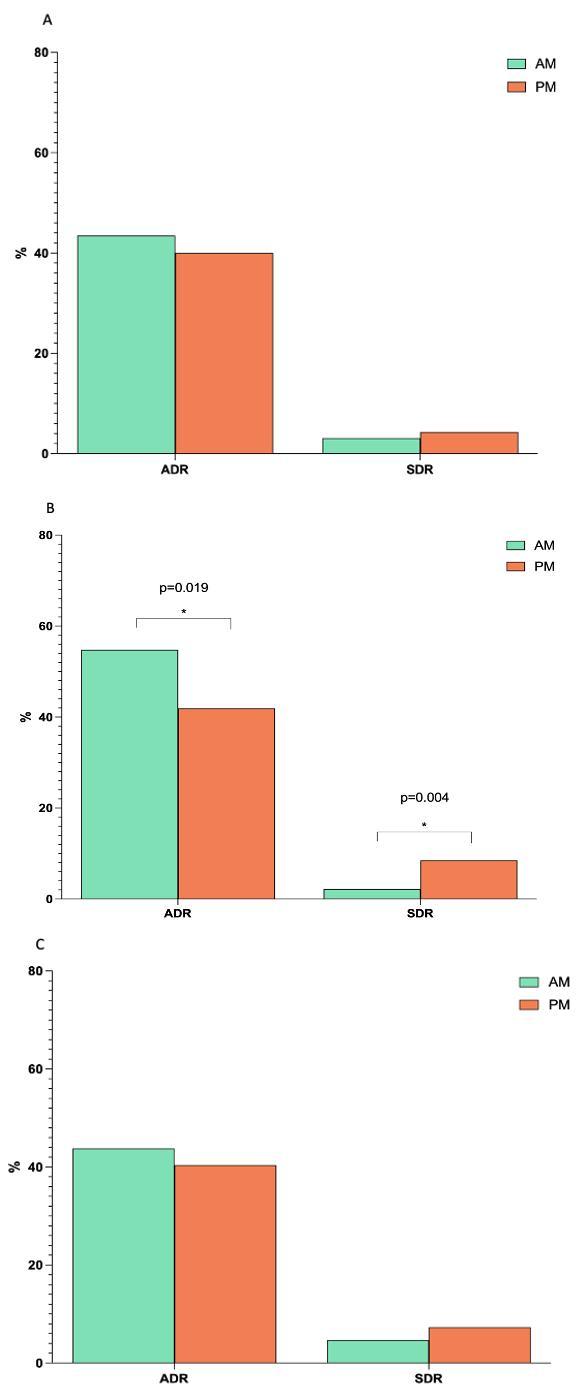Tuesday Poster Session
Category: General Endoscopy
P4085 - Does the Timing of Colonoscopy Impact the Detection of Sessile Serrated Polyps for Fellowship Trainees?
Tuesday, October 29, 2024
10:30 AM - 4:00 PM ET
Location: Exhibit Hall E

Has Audio
- MB
Mehak Bassi, MD
Saint Peter's University Hospital / Rutgers Robert Wood Johnson Medical School
New Brunswick, NJ
Presenting Author(s)
Mehak Bassi, MD1, Beatriz Gros Alcade, MD2, Aadhithyaraman Santharaman, MD3, Archit Garg, MD4, Khyati Bidani, MD5, Richa Rani, MD6, Sugirdhana Velpari, MD1, Andrew Korman, MD5, Arkady Broder, MD4
1Saint Peter's University Hospital / Rutgers Robert Wood Johnson Medical School, New Brunswick, NJ; 2Reina Sofia University Hospital, Cordoba, Andalucia, Spain; 3Saint Peter's University Hospital/Robert Wood Johnson, New Brunswick, NJ; 4Saint Peter's University Hospital, New Brunswick, NJ; 5Saint Peter's University Hospital/Robert Wood Johnson Hospital, New Brunswick, NJ; 6Saint Peter’s University Hospital, New Brunswick, NJ
Introduction: Sessile serrated polyps (SSPs) are challenging to detect due to their flat, subtle appearance. Detection rates are influenced by factors like timing, with studies showing higher adenoma detection rates (ADR) earlier in the day, potentially due to endoscopist fatigue. However, more research is needed on SSP detection(SDR) timing, especially among trainees during the fellowship. Our study compared the detection of SSPs and tubular adenomas during morning and afternoon colonoscopies among trainees at different levels, aiming to objectively assess their proficiency in performing colonoscopies.
Methods: We reviewed 1,600 screening colonoscopies (median age 57; 59.4% women) performed by 14 fellows at our institute. Morning colonoscopies started before noon; afternoon colonoscopies began after. ADR is defined as one tubular adenoma per colonoscopy, while SDR is defined as one sessile serrated polyp per colonoscopy.
Results: First-year fellows (F1) performed 201 colonoscopies (Figure A) with an SDR of 3.5%, showing no significant difference between morning (3.1%) and afternoon (4.3%) rates (p=0.650). The ADR was 43.5% in the morning and 40% in the afternoon (p=0.631).
Second-year fellows (F2) performed 384 colonoscopies (Figure B), with an overall SDR of 4.1%, significantly higher in the afternoon (8.5% vs. 2.2%, p=0.004). The morning ADR was 54.8%, higher than the afternoon rate of 41.9% (p=0.019).
Third-year fellows (F3) conducted 427 colonoscopies (Figure C) with an overall SDR of 5.6%. The morning SDR was 4.7%, compared to 7.3% in the afternoon (p=0.269). The ADR was 43.8% in the morning and 40.4% in the afternoon (p=0.492).
Overall, the SDR was 4.1% in the morning and 6.5% in the afternoon (p=0.038), indicating insignificant results. There was no significant difference in overall ADR between morning and afternoon (44.2% vs. 39.7%, p=0.093). The overall polyp detection rate was similar in the morning and afternoon (65.5% vs. 64.6%, p=0.718).
Discussion: Our study indicated that the colonoscopy procedure start time did not predict a sessile serrated polyp detection rate. Comparing morning and afternoon procedures among trainees, second-year fellows had higher afternoon SDRs, likely due to increased experience and supervision. With more autonomy, third-year fellows showed no significant differences in overall polyp detection rates between morning and afternoon, suggesting that factors like trainee experience and supervision are more critical in detection outcomes than procedure start time.

Disclosures:
Mehak Bassi, MD1, Beatriz Gros Alcade, MD2, Aadhithyaraman Santharaman, MD3, Archit Garg, MD4, Khyati Bidani, MD5, Richa Rani, MD6, Sugirdhana Velpari, MD1, Andrew Korman, MD5, Arkady Broder, MD4. P4085 - Does the Timing of Colonoscopy Impact the Detection of Sessile Serrated Polyps for Fellowship Trainees?, ACG 2024 Annual Scientific Meeting Abstracts. Philadelphia, PA: American College of Gastroenterology.
1Saint Peter's University Hospital / Rutgers Robert Wood Johnson Medical School, New Brunswick, NJ; 2Reina Sofia University Hospital, Cordoba, Andalucia, Spain; 3Saint Peter's University Hospital/Robert Wood Johnson, New Brunswick, NJ; 4Saint Peter's University Hospital, New Brunswick, NJ; 5Saint Peter's University Hospital/Robert Wood Johnson Hospital, New Brunswick, NJ; 6Saint Peter’s University Hospital, New Brunswick, NJ
Introduction: Sessile serrated polyps (SSPs) are challenging to detect due to their flat, subtle appearance. Detection rates are influenced by factors like timing, with studies showing higher adenoma detection rates (ADR) earlier in the day, potentially due to endoscopist fatigue. However, more research is needed on SSP detection(SDR) timing, especially among trainees during the fellowship. Our study compared the detection of SSPs and tubular adenomas during morning and afternoon colonoscopies among trainees at different levels, aiming to objectively assess their proficiency in performing colonoscopies.
Methods: We reviewed 1,600 screening colonoscopies (median age 57; 59.4% women) performed by 14 fellows at our institute. Morning colonoscopies started before noon; afternoon colonoscopies began after. ADR is defined as one tubular adenoma per colonoscopy, while SDR is defined as one sessile serrated polyp per colonoscopy.
Results: First-year fellows (F1) performed 201 colonoscopies (Figure A) with an SDR of 3.5%, showing no significant difference between morning (3.1%) and afternoon (4.3%) rates (p=0.650). The ADR was 43.5% in the morning and 40% in the afternoon (p=0.631).
Second-year fellows (F2) performed 384 colonoscopies (Figure B), with an overall SDR of 4.1%, significantly higher in the afternoon (8.5% vs. 2.2%, p=0.004). The morning ADR was 54.8%, higher than the afternoon rate of 41.9% (p=0.019).
Third-year fellows (F3) conducted 427 colonoscopies (Figure C) with an overall SDR of 5.6%. The morning SDR was 4.7%, compared to 7.3% in the afternoon (p=0.269). The ADR was 43.8% in the morning and 40.4% in the afternoon (p=0.492).
Overall, the SDR was 4.1% in the morning and 6.5% in the afternoon (p=0.038), indicating insignificant results. There was no significant difference in overall ADR between morning and afternoon (44.2% vs. 39.7%, p=0.093). The overall polyp detection rate was similar in the morning and afternoon (65.5% vs. 64.6%, p=0.718).
Discussion: Our study indicated that the colonoscopy procedure start time did not predict a sessile serrated polyp detection rate. Comparing morning and afternoon procedures among trainees, second-year fellows had higher afternoon SDRs, likely due to increased experience and supervision. With more autonomy, third-year fellows showed no significant differences in overall polyp detection rates between morning and afternoon, suggesting that factors like trainee experience and supervision are more critical in detection outcomes than procedure start time.

Figure: Figure A: First-year fellows ADR and SDR
Figure B: Second-year fellows ADR and SDR
Figure C: Third Year Fellows ADR and SDR
Figure B: Second-year fellows ADR and SDR
Figure C: Third Year Fellows ADR and SDR
Disclosures:
Mehak Bassi indicated no relevant financial relationships.
Beatriz Gros Alcade indicated no relevant financial relationships.
Aadhithyaraman Santharaman indicated no relevant financial relationships.
Archit Garg indicated no relevant financial relationships.
Khyati Bidani indicated no relevant financial relationships.
Richa Rani indicated no relevant financial relationships.
Sugirdhana Velpari indicated no relevant financial relationships.
Andrew Korman indicated no relevant financial relationships.
Arkady Broder indicated no relevant financial relationships.
Mehak Bassi, MD1, Beatriz Gros Alcade, MD2, Aadhithyaraman Santharaman, MD3, Archit Garg, MD4, Khyati Bidani, MD5, Richa Rani, MD6, Sugirdhana Velpari, MD1, Andrew Korman, MD5, Arkady Broder, MD4. P4085 - Does the Timing of Colonoscopy Impact the Detection of Sessile Serrated Polyps for Fellowship Trainees?, ACG 2024 Annual Scientific Meeting Abstracts. Philadelphia, PA: American College of Gastroenterology.
